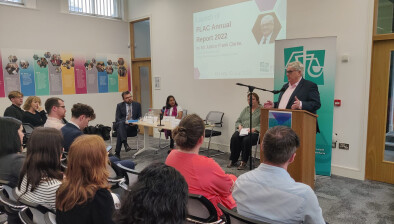High Court: Fresh concerns regarding provision of ‘trust’ services to unrepresented litigants for reward

The High Court has struck out proceedings brought in respect of an order for possession over a Wexford property because they were res judicata and an abuse of process, echoing Ms Justice Eileen Roberts’ concerns about the ‘services’ provided by the second plaintiff.

About this case:
- Citation:[2024] IEHC 116
- Judgment:
- Court:High Court
- Judge:Mr Justice Rory Mulcahy
Delivering judgment for the High Court, Mr Justice Rory Mulcahy deprecated the “almost identical and wholly unstateable arguments have been pursued by the plaintiffs in circumstances where, Mr Allen in particular, can have had no realistic expectation that they would have any prospect of success”.
Background
In February 2019, the Circuit Court made an order for possession in favour of Shoreline Residential DAC in respect of the first plaintiff’s property in Enniscorthy, Co Wexford. The first plaintiff appealed in March 2019.
Following a transfer of Shoreline’s rights, title and interest in the property and the underlying loan facility to the first defendant, it was added as a co-plaintiff in the possession proceedings in March 2020. The first plaintiff’s appeal was heard on 8 July 2021, and by order dated 6 October 2021, the High Court granted possession of the property to the defendant.
The first plaintiff made an application to the Supreme Court for leave to appeal. The Supreme Court, concerned that first plaintiff might have been denied his right to redeem the mortgage, communicated with the parties through the Registrar to enquire as to whether the applicant still intended to pay the full amount on the mortgage, as he had asserted. The Supreme Court adjourned its consideration of the matter to allow the first plaintiff to discharge his liability. Having failed to discharge liability, leave was ultimately refused.
Despite the matter having been finally determined by the courts, the plaintiffs issued High Court proceedings in 2022 disputing the defendant’s entitlement to possession. The first defendant applied to strike out the application pursuant to Order 19, Rule 28 of the Rules of the Superior Courts or pursuant to the court’s inherent jurisdiction.
The High Court
Mr Justice Mulcahy noted the plaintiffs’ claim that the first defendant did not establish that it had sufficient title to the property in Enniscorthy on the basis that it had not provided a “certified, Formal letter of Redemption… declaring all of the alleged contractual obligations and under what authority [Pepper] is holding beneficial title absolute”, rendering the plaintiffs unable to discharge the charge on the property.
The judge also highlighted the plaintiffs’ claim that “Pepper is a legal fiction that cannot own property or maintain any claim superior to any living man” and so could not be registered as the legal owner of the property and the declaration sought as to the plaintiffs’ “natural right to use a promissory note to discharge the charge”.
The High Court considered the statement of claim, which inter alia described the property as having been placed into a “private irrevocable family trust” with the second defendant as trustee in 2013. The court pointed out that no evidence of the trust had been furnished and the first plaintiff did not refer to the trust in the course of the possession proceedings despite its alleged creation in 2013.
Turning to the defendants’ application to strike out the proceedings as attempting to look behind the High Court’s order of 6 October 2022, Mr Justice Mulcahy noted the plaintiffs’ affidavits which asserted that the courts’ orders were not being challenged, rather that the plaintiffs brought the proceedings “in a bid to determine to whom the first plaintiff was obligated, claiming that there was confusion as to which entity actually has beneficial interest in and entitlement to settlement of the charge”.
Noting the applicable principles in relation to striking out proceedings and abuse of process as being those in Scotchstone Capital Fund Ltd v Ireland [2022] IECA 23 and Mullaney v Ireland [2023] IECA 195 respectively, Mr Justice Mulcahy stated that those principles had been applied in a previous decision of the High Court striking out the second plaintiff’s claim against Bank of Ireland.
The court outlined that those proceedings involved “strikingly similar circumstances to this case”, in which “the property in question had purportedly been placed in an irrevocable trust, possession proceedings had been brought by the defendants and finally determined, and an Order for Possession had been made. As here, the main relief seemed to relate to a claim to be entitled to a ‘formal letter of redemption’, the absence of which prevented the plaintiffs from settling matters.”
Recounting that Ms Justice Eileen Roberts had been “scathing” about the second plaintiff’s practice in providing “a template of hopelessly misconceived ‘irrevocable private trusts’… to unrepresented litigants, apparently for reward”, Mr Justice Mulcahy determined that he could “only echo that concern, which is heightened by these proceedings in which, it would appear, almost identical and wholly unstateable arguments have been pursued by the plaintiffs in circumstances where, Mr Allen in particular, can have had no realistic expectation that they would have any prospect of success”.
Commenting that “all that has been achieved is delay and additional expense for the parties involved, which will, no doubt, ultimately be laid at the door of Mr Jacob when Pepper comes to realise its security”, the court considered that “it is abundantly clear that, whether considered pursuant to Order 19, Rule 28 or the inherent jurisdiction of the Court, the plaintiffs can only be regarded as an abuse of process which is bound to fail… The issues are manifestly res judicata.”
Conclusion
Accordingly, the High Court struck out the proceedings pursuant to its inherent jurisdiction and pursuant to Order 19, Rule 28 of the Rules of the Superior Courts.
Jacob & Anor v. Pepper Finance Corporation (Ireland) DAC & Ors [2024] IEHC 116











